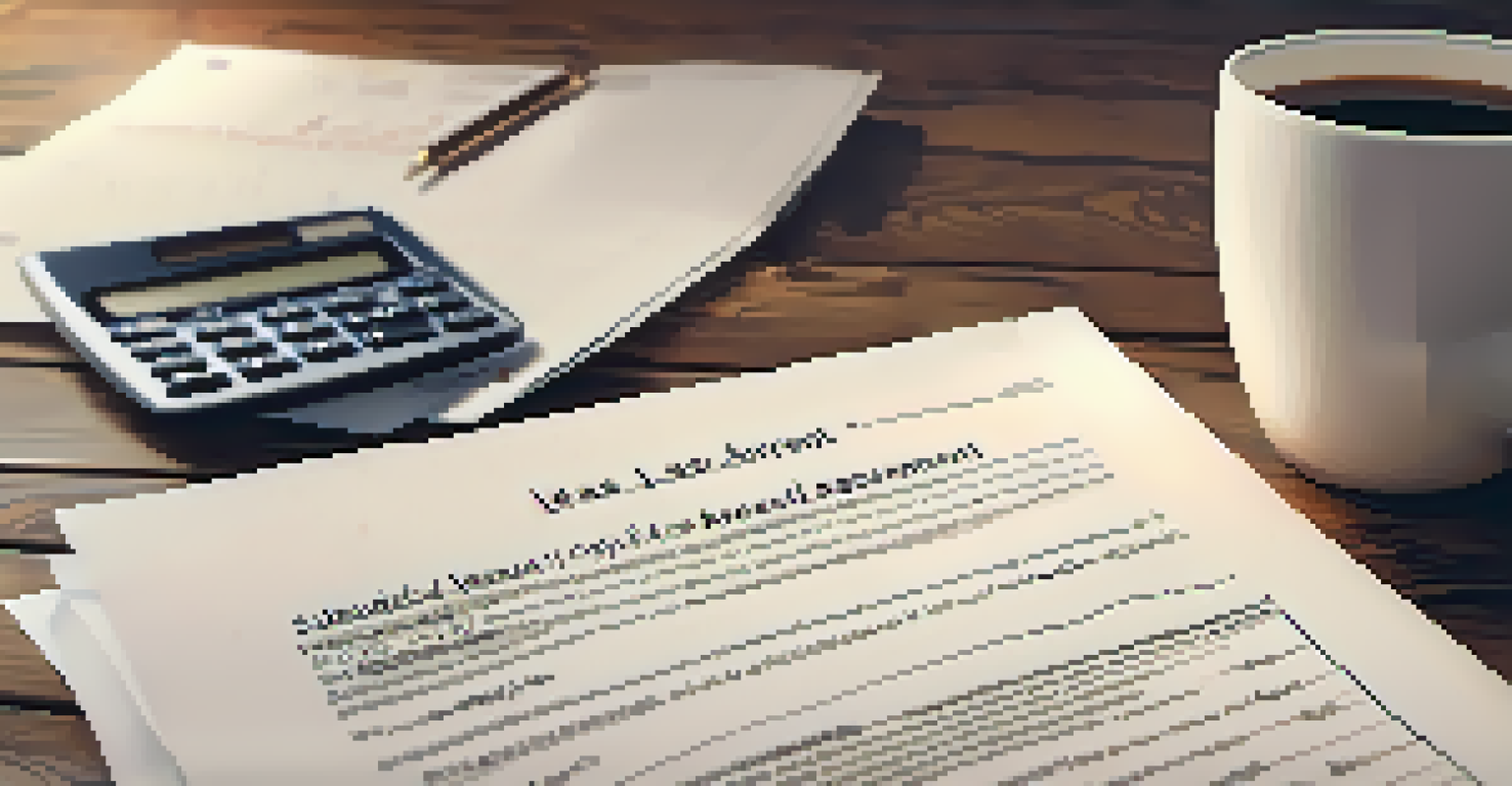Understanding the Legal Aspects of Commercial Leases

What is a Commercial Lease and Why It Matters
A commercial lease is a legally binding agreement between a landlord and a business tenant for the rental of business property. Unlike residential leases, these agreements are tailored to meet the specific needs of businesses, making them crucial for operational success. Understanding the terms and conditions of a commercial lease can save you from costly disputes and misunderstandings down the line.
A good lease is not just about negotiating rent; it’s about understanding the entire relationship between landlord and tenant.
Commercial leases often include various clauses that dictate everything from rent adjustments to maintenance responsibilities. It's essential for business owners to grasp these elements to ensure they’re not caught off-guard by unexpected costs or legal obligations. A well-understood lease can lead to a harmonious landlord-tenant relationship, which is vital for business stability.
In short, knowing what a commercial lease entails can empower you as a tenant, allowing you to negotiate better terms and protect your interests. Whether you're a startup or an established enterprise, a solid grasp of your lease agreement can make or break your business experience.
Key Terms You Need to Know in Commercial Leases
When diving into a commercial lease, familiarize yourself with key terms like 'base rent,' 'common area maintenance,' and 'gross lease' versus 'net lease.' Base rent refers to the minimum rent payable, while common area maintenance fees cover shared expenses. Understanding these terms helps clarify your financial obligations and can aid in budgeting for your business.

Another important term is 'tenant improvements,' which are modifications made to the rental space to suit your business needs. Knowing who pays for these improvements and how they affect your lease can influence your decision-making process. A clear understanding of these concepts can prevent miscommunication and ensure that both parties are on the same page.
Understanding Commercial Leases
A commercial lease is a crucial agreement that outlines the rental terms between a landlord and a business tenant, impacting operational success.
Lastly, be aware of the term 'lease term,' which outlines the duration of your lease agreement. A shorter lease can provide flexibility, while a longer lease might offer stability in rent costs. Each option comes with its pros and cons, so weigh them carefully based on your business strategy.
Understanding Rent and Additional Costs
Rent is often the most significant expense for businesses under a commercial lease, but it’s not the only cost to consider. Many leases include additional costs like property taxes, insurance, and maintenance fees. These extra expenses can add up quickly, so it's essential to factor them into your budget before signing on the dotted line.
The devil is in the details; pay attention to the fine print in your lease to avoid future headaches.
Different lease structures can affect how these costs are allocated. For example, in a gross lease, the landlord typically covers most expenses, while in a net lease, the tenant takes on more financial responsibility. Understanding these nuances will help you negotiate terms that align with your financial capabilities and business model.
Always ask for a clear breakdown of all potential costs associated with the lease. This transparency ensures there are no surprises later on and allows you to make an informed decision about what you can realistically afford.
Lease Duration and Renewal Options Explained
The duration of a commercial lease can vary significantly, typically ranging from one to ten years or even longer. Understanding the length of your lease is crucial because it impacts your business stability and planning. A long lease can provide security, while a short lease offers flexibility, which might suit startups or businesses in transition.
Additionally, many commercial leases include renewal options, allowing you to extend your lease for an additional term. Knowing how these options work can save you from the stress of searching for a new location if your business grows or stabilizes. Make sure to clarify the conditions under which renewals can occur to avoid any potential pitfalls.
Key Terms and Financial Obligations
Familiarizing yourself with important terms like base rent and maintenance fees is essential for budgeting and avoiding unexpected costs.
It's also important to consider market conditions when negotiating lease terms. If the market is favorable for tenants, you might have more leverage to negotiate a longer lease with better terms. Balancing your business needs with market realities can lead to a lease agreement that serves you well in the long run.
Understanding Lease Termination Clauses
Termination clauses in a lease outline the conditions under which either party can terminate the lease agreement. Understanding these clauses is crucial, as they can have significant implications for your business. For instance, a lease might allow a tenant to exit early under specific conditions, which can be a lifesaver if your business needs change suddenly.
These clauses can also specify penalties for early termination, which can include forfeiting your security deposit or paying additional fees. Knowing the potential consequences of terminating your lease early ensures you’re prepared for any scenario that may arise during your business operations.
It's beneficial to negotiate favorable termination terms that align with your business strategy. By doing so, you can safeguard your interests and maintain flexibility, which is particularly important in today’s ever-changing business landscape.
The Importance of Maintenance and Repairs Clauses
Maintenance and repair clauses outline the responsibilities of both the landlord and tenant regarding property upkeep. Knowing who is responsible for repairs can save you from unexpected repair costs that could strain your budget. Typically, landlords cover structural repairs, while tenants are responsible for interior maintenance, but this can vary, so it’s essential to clarify these details in your lease.
Understanding these clauses helps set expectations and can prevent disputes down the line. For example, if an HVAC system breaks, knowing who is responsible for repairs can prevent finger-pointing and frustration. It's always a good idea to document any maintenance issues in writing to ensure that both parties are aware of their responsibilities.
Importance of Legal Advice
Consulting a legal professional can help you navigate lease complexities and avoid common pitfalls that could lead to costly disputes.
Additionally, you might want to negotiate terms that are more favorable to you as a tenant, especially if you anticipate needing extensive modifications or upgrades. A well-defined maintenance agreement can create a smoother operating environment for your business.
Legal Considerations and Common Pitfalls to Avoid
Navigating the legal landscape of commercial leases can be tricky, and there are common pitfalls that many business owners encounter. One of the most significant mistakes is failing to read the lease thoroughly or seeking legal advice. A lease is a legal document, and overlooking even a small detail can lead to severe consequences.
It's essential to consult with a legal professional who specializes in commercial leases to ensure you fully understand your rights and obligations. They can help identify any clauses that may not be in your best interest and suggest modifications before you sign. Investing in legal advice upfront can save you from costly disputes later.

Another common pitfall is ignoring local laws and regulations that may impact your lease. Each jurisdiction has its rules regarding commercial leasing, so being informed can help you avoid legal complications. Staying proactive about these considerations ensures that you enter into your lease with confidence and clarity.